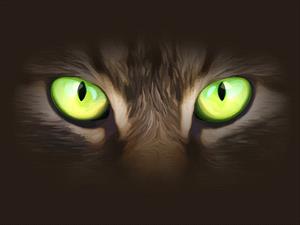Knowing what to keep your own eyes peeled for can help you identify potential problems in your cat's before they become serious.
Cat's green eyes

Photo courtesy of Depositphotos
Cats' eyes have long been considered one of their most beautiful and mysterious features. From the almost iridescent green and yellow color of their irises to their uniquely-shaped pupils, cat’s eyes are one of the first things you notice about them.
Many of the anatomic components of a cat’s eye are similar to the human eye, but one main difference is the reflective structure in their retina known as the tapetum lucidum, which acts like a mirror. It reflects incoming light back on to the retina. It helps cats to see in dim light (beneficial for hunting), plus it also gives their eyes that spooky glow when you go to the kitchen for a midnight snack and catch Fluffy sitting on the counter.
Built-in night vision goggles may make cat's eyes seem preternatural, but they aren't immune to eye health issues. Many eye diseases that affect humans can also develop in cats, such as infections, corneal ulcers, inflammation (uveitis, retinitis), cataracts, retinal detachment and glaucoma. Eye injuries are also a relatively common cause of problems in cats. Cats and curiosity go hand in hand (or would that be paw in paw?), which often results in injury to the curious party, the object of that curiosity, or both. Even indoor cats can get scratched in the cornea by a housemate or exposed to foreign material and chemicals.
One of the most common causes of infection in cat eyes is herpesvirus. Cats have their own herpesvirus and it is only transmitted between cats (no need to share), not between cats and dogs or cats and people. However, it can cause an upper respiratory infection, conjunctivitis and corneal disease.
Inflammation inside a cat’s eye is often a sign of an internal illness with certain infections (FeLV, FIV, FIP, toxoplasmosis), cancer, kidney disease or high blood pressure. Inflammation in the front part of the eye is the most common cause of glaucoma, which can be serious and lead to blindness.
Knowing what to keep your own eyes peeled for can help you identify potential problems before they become serious. Pad on over to your veterinarian if your cat shows any of these symptoms:
- Redness
- Swelling
- Discharge
- Rubbing
- Squinting
- Bleeding from or around the eye
- Change in appearance, size or position of the eye
- Change or differences in the pupil size
- Decrease in vision
- Change in behavior – hiding, reluctance to play or jump up on things
- Evidence of trauma to the face, head, eyelids
Many of the most common feline eye problems you might encounter have similar symptoms, making them difficult to differentiate from each other. Some of these problems can be true medical emergencies, so if you have concerns about your cat’s eye health, it's best to schedule an appointment with your veterinarian as soon as possible or even skedaddle off to the ER.
At the hospital, the veterinarian will thoroughly examine the eye and may perform certain ophthalmic tests, such as tear measurement, staining the cornea to look for an ulcer, measuring eye pressure for glaucoma, and examining the interior of the eye with one or more instruments. Don't worry, cats are thrilled with these tests! (Extreme sarcasm there.) Some eye diseases are treated with topical eye drops or ointments (a completely different approach from sneaking pills into food), while others also require pills or injectable medications. Some eye conditions require corrective surgery.
Many eye problems can be managed by your primary veterinarian. However, if something complicated is diagnosed, your kitty may be referred to a veterinary eye specialist: "Is the little mousie more in focus or less?"